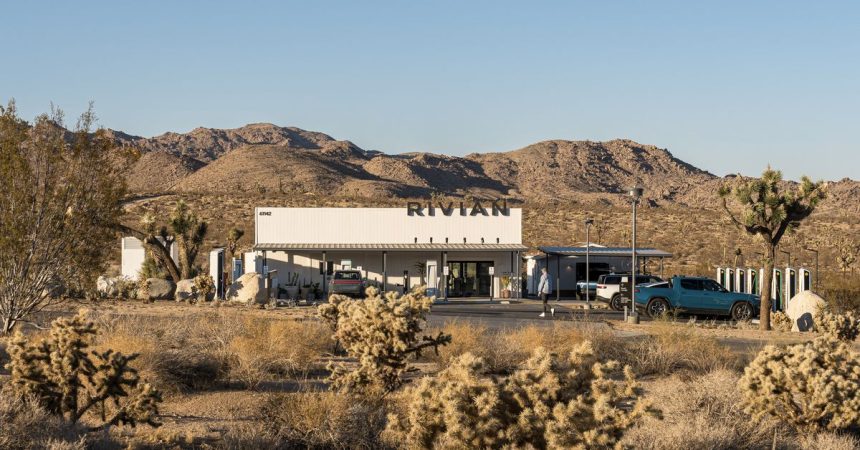Rivian, the electric vehicle manufacturer known for its adventurous R1T pickup truck and R1S SUV, has unveiled a significant shift in its charging strategy with the opening of its first public charging station accessible to all electric vehicle brands. Located in the scenic Joshua Tree National Park in California, this new station marks a departure from Rivian’s previous approach of exclusively serving its own customers through its Rivian Adventure Network. This move aligns with the broader industry trend towards open access and interoperability in EV charging, driven in part by federal funding requirements and the growing need for a seamless charging experience for all EV drivers.
The new charging station in Joshua Tree showcases a modernized design with enhanced user-friendliness. Larger displays provide clear instructions and information, while the integrated tap-to-pay functionality streamlines the payment process, eliminating the need for membership cards or dedicated apps. This intuitive design caters to drivers of any EV brand, fostering a more inclusive charging experience. This signifies Rivian’s commitment to not only expanding its charging infrastructure but also improving the overall charging experience for the wider EV community.
Previously, Rivian’s charging network, comprising 560 chargers across 92 locations nationwide, was exclusively available to owners of its R1T and R1S vehicles. This exclusivity mirrored Tesla’s initial strategy with its Supercharger network, which prioritized serving its own customer base. However, the landscape of EV charging is evolving rapidly, influenced by substantial federal investments aimed at accelerating the adoption of electric vehicles. To qualify for this funding, charging stations must be accessible to all EVs, regardless of brand, promoting a more unified and accessible charging network across the country.
Rivian’s charging stations utilize the industry-standard CCS connector for DC fast charging, a widely adopted technology that ensures compatibility with a broad range of EVs. However, until now, Rivian maintained exclusivity through proprietary software that restricted access to its chargers. The opening of the Joshua Tree station marks the beginning of dismantling this exclusivity, with Rivian committing to opening future charging sites to all EV brands. This decision reflects a growing understanding within the industry that widespread EV adoption requires a collaborative approach to charging infrastructure development, moving away from brand-specific networks towards a more universally accessible system.
Rivian’s plans extend beyond the Joshua Tree location. The company has announced its intention to expand its charging network to several states, including Texas, Colorado, Illinois, Montana, Pennsylvania, Michigan, and New York, by the end of 2024. These new charging sites will be designed from the outset to accommodate all EV brands, reflecting Rivian’s commitment to an open and inclusive charging network. Existing Rivian charging stations will also undergo upgrades, including software updates to enable access for non-Rivian EVs and hardware updates to incorporate NACS charging plugs, catering to the growing adoption of Tesla’s charging standard.
In the interim, while the retrofitting process is underway, Tesla owners can access the Joshua Tree charging station and other future Rivian locations using NACS-to-CCS adapters. This interim solution ensures that Tesla drivers can benefit from the expanding Rivian network while the company works towards full NACS integration. Rivian’s proactive approach to accommodating Tesla vehicles underscores its commitment to serving the broader EV community and promoting interoperability within the charging ecosystem. This move towards inclusivity not only benefits drivers but also contributes to the overall growth and development of the EV market.



